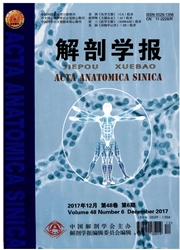

 中文摘要:
中文摘要:
目的观察复方鳖甲软肝方药物血清对大鼠肝星形细胞(HSCs)内TβRⅠ和Smad3蛋白表达的影响,从信号转导上游受体水平和受体后信号转导水平探讨药物血清抗肝纤维化的作用机制。方法运用免疫细胞化学和图像分析技术,在离体对不同时相,不同浓度复方鳖甲软肝方药物血清干预状态下,HSC内TβRⅠ和Smad3蛋白的表达进行半定量分析。结果复方鳖甲软肝方药物血清可明显下调HSC表达TβRⅠ及抑制HSC表达Smad3蛋白。结论复方鳖甲软肝方药物血清通过下调TβRⅠ的表达,进而干预Smad3介导的TGF-β1在HSC内的信号转导,最终抑制胶原蛋白、纤黏连蛋白的合成,从而达到抑制HSC活化的抗肝纤维化作用,这可能是复方鳖甲软肝方药物血清抗肝纤维化作用机制之一。
 英文摘要:
英文摘要:
Objective To investigate the effect of fufangbiejiaruanganfang drug serum on the expression of TGF-β type I receptor and Smad_3 protein in rat hepatic stellate cells(HSCs).Methods Immunocytochemical staining and image analysis were applied to investigate the effect of different dosages of fufangbiejiaruanganfang drug serums on the expression of TGF-β type I receptor and Smad_3 protein in rat HSCs.Results High and medium dosage of fufangbiejiaruanganfang drug serum remarkably downregulated the expression of TGF-β type I receptor and Smad_3 protein in rat HSCs in a dose-dependent manner.Conclusion The experiment demonstrated that fufangbiejiaruanganfang drug serums can downregulate the expression of TGF-β type I receptor and Smad_3 protein in HSCs and further inhibit the activation of HSCs and improve liver fibrosis.So the downregulation of TGFβ type I receptor in HSCs may be one of the mechanisms of fufangbiejiaruanganfang against liver fibrosis.
 同期刊论文项目
同期刊论文项目
 同项目期刊论文
同项目期刊论文
 期刊信息
期刊信息
